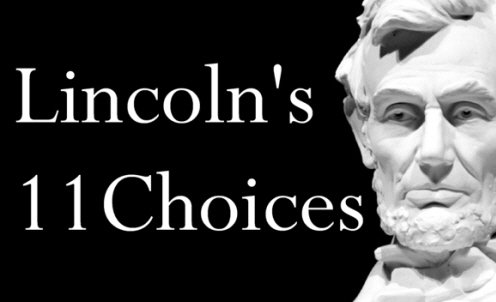
Eleven personal choices set Lincoln’s leadership apart and brought him support even from his foes. Here they are with adoption suggestions to increase your effectiveness, influence, and goodwill.
Lincoln chose to:
1 – Serve What’s Greater
Criticized personally for everything from his appearance to his views, Lincoln still appointed those he felt could contribute despite their previous insults. He put the nation’s interests ahead of personal feelings and earned the loyalty of once-reluctant nominees. Appoint a one-time adversary to a role for which they are suited.
2 – Offer Sincere Friendship
Even Lincoln’s staunchest political foes believed he truly wished them well as individuals. Demonstrate in some tangible way your personal care for a colleague whose views you rarely share.
3 – Entertain Diverse Opinions
Lincoln sought opportunities to really listen to those who disagreed with him and reminded coworkers that similarly-focused, well-intentioned people may still differ. In the next month, set a meeting to fully listen to someone who doesn’t share your perspective.
4 – Argue What’s Supportable
Beyond merely listening, Lincoln parsed others’ arguments to discover elements he could applaud. By starting with these, he hoped his objectivity would encourage kinship and open minds to the specific points he wished to promote. For your next proposal, argue the opposing side for whatever are common goals, then describe what you hold to be unique and critical.
5 – Oppose Only Ideas
Lincoln never let his opposition of perspectives degenerate to the demonization of adversaries. He considered all individuals and beliefs worthy of respect. Catch yourself when you are tempted to assail the character of another and affirm their good intentions to others.
6 – Remain Open-Minded
Lincoln, as all good leaders, was resolute and determined, but, as a great leader, he stayed open to others’ astute arguments and willing to change his position on even weighty matters. Coach your direct reports to form well-reasoned arguments when they disagree with you, work to listen without being defensive, and look for opportunities to demonstrate your readiness to change.
7 – Guard Against Misunderstandings
Lincoln knew passionate opinions and written comments can be easily misinterpreted. When possible, Lincoln met and spoke with individuals directly to allow his intent and tone to be accurately conveyed. Next time you sense a discussion is becoming pointed, decide to drop by, teleconference, or, at least, speak by phone to ensure both your ideas and respect come through.
8 – Ignore the Petty
Lincoln considered that spending time on disagreements to be a waste of life’s most precious commodity. Most leaders have an internal threshold for the daily irritations we choose to overlook. This year decide to raise the level of annoyance required to provoke your reaction. Every year, determine to increase it further.
9 – Manage His Emotions
Lincoln knew his own nature and the potential damage which could be caused by communicating while upset. He penned heated rebukes to release his own emotions, but then, brilliantly, aged them in a folder until objectivity returned. Create a special sub-folder in your email program or desktop folder, and determine to send heated replies or letters there to simmer for at least 24 hours.
10 – Accommodate Human Emotions
Lincoln believed mercy to be the most fruitful of character traits for building relationships and forging alliances. Lincoln knew humans fail frequently and considered forgiveness the quickest path to restoration. Choose to overlook a previous instance and decide to interact normally with the individual without first raising the matter.
11 – Win Other’s Esteem
Lincoln’s personal objective was not to obtain a position or status—rather it was to ‘win the esteem of others’ and this “resulted in a self-validating cycle: His life goal, to win the esteem of others, caused him to respect those he met, which made them more open to his influence, which increased the potential support available to help him achieve his objectives.”** This month reconsider your objectives—Lincoln’s goal changed the way he viewed and respected others, transformed his interactions, and made him one of history’s most effective leaders.
** – Miles, Keith N., The Lincoln Authority, Streamlined Press, 2014
Our Choices Resonate
Lincoln’s choices were his—independent of others’ opinions or actions. We, as leaders, can likewise choose and make our workplaces better—worthy of employee engagement and outstanding loyalty. Please pass this on, especially if you’re thinking of a colleague right now who you’d like to challenge or encourage.
********** Lincoln image from iStockphoto.com

Adapted from the chapter “Authority Creates Allies” from the book, The Lincoln Authority – How to Lead with Authority in Today’s Organizations, by Keith N. Miles. Streamlined Press, 2014
Keith N. Miles MBA is an author, speaker, management consultant, and President of Streamlined Management Group Inc. His new book, The Lincoln Authority (Amazon US, CA, UK) is a leader’s guide to the exercise of firm and positive authority—because only balanced leadership delivers immediate results and keeps employees engaged. The Lincoln Authority is concise, practical, and authority principles come alive with brief glimpses from the life of Abraham Lincoln.
